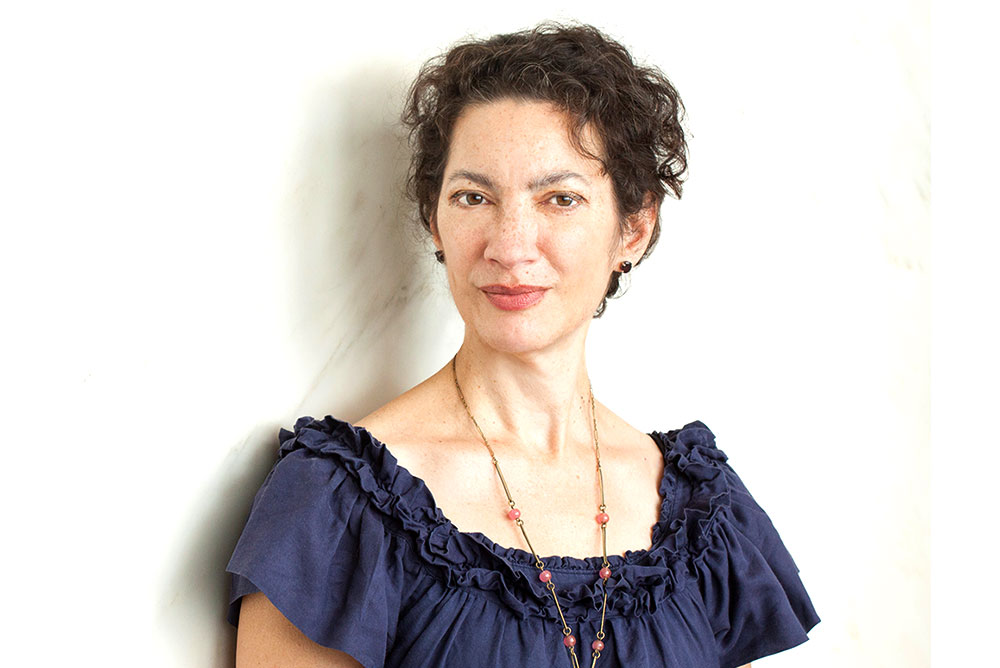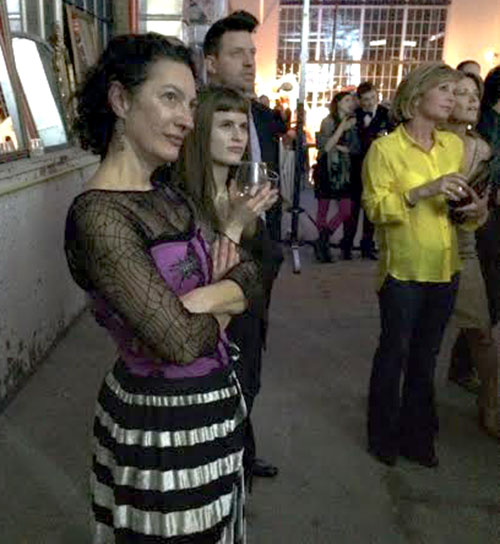
RECENTLY MyLittleBird contributor Judith Robinson had the opportunity to share an especially lovely autumn afternoon with Karla Boos, the artistic director of Quantum Theater, the company she founded in 1990.
We wanted to know everything about her and everything about Quantum, the theater company whose home is not a theater at all; Quantum’s home is the city of Pittsburgh itself.
JR: How do you describe Quantum? What is it you’re trying to accomplish?
KB: I think one of our goals is to provide something you can’t easily experience in a conventional building with a stage, seats and walls. I like to think about what is needed to be jolted alive.
JR: And how does that happen?
KB: Well, for one thing, we use the vast opportunities provided by the environment.
JR: Well, you constantly surprise us. I recall productions in warehouses, cemeteries and hayfields…
KB: Yes, and our last play, The Odyssey, took place at Schenley Park Ice Rink.
JR: Yes, we saw it, and it was wonderful. What inspired that choice?
KB: Well, the ice rink really gave us the sense of a Greek amphitheater, especially when the scenic designer’s immediate choice was to face the audience toward the pine trees and setting sun (and it is a place of sport, civic gathering after all, like a Greek amphitheater).
JR: That leads us to ask the reason for the former steel mill for your production of King Lear.
KB: Carrie Blast Furnace—the “King” of mills—so embodied the themes of Lear, once mighty, now fallen. The hubris of Lear matched that of the steel barons who thought what they built would go on forever. Their ghosts were on our “heath” for sure!

Karla Boos pictured in the foreground at the annual Quantum Theater Ball./ Courtesy of Quantum Theater.
JR: Do you worry about running out of places?
KB: No, not at all. That’s because of Pittsburgh. For a lot of reasons, I don’t think this could go on as successfully just anywhere. First of all, this city is filled with beautiful green spaces and is architecturally gorgeous. Then there’s all the history and historical sites. But it’s also about the people of Pittsburgh, the friendliness and the connectedness. There always seems to be someone who knows someone else and responds when something is needed.
JR: As a lifelong Pittsburgher, that’s nice to hear. Are you one, too?
KB: No, I was born in Las Vegas, of all places! My father worked for Titanium Metals and was working on the Hoover Dam. There wasn’t much else there at that time. No Sinatra, no big casinos yet. My Sicilian grandparents visited us and thought they had landed on the moon.
JR: So this creative artist-to-be grew up in a desert?
KB: Oh, no. I was a baby when we left and we ended up in West Virginia. I grew up in Wheeling.
JR: That’s just as surprising! Not a place we expect to nurture someone in the arts. How did it happen for you?
KB: Well, as many people in theater will tell you, I was shy as a child. But I actually had a big life in books.
JR: So, you were a reader.
KB: Yes, and I had culturally aware parents. But mainly my way into what became my life was through dance. Studying ballet, following it on PBS, attending Mount de Chantal Visitation Academy in Wheeling, all contributed to my passion for dance.
JR: You still look and move like a dancer. Were there role models for you as a girl?
KB: Thanks! And yes, I idolized Natalia Makarova, the Russian ballerina and Ann Reinking, on Broadway in the ’70s. Mount de Chantal, built in the 1860s, also gets credit for educating me and nurturing my interest in the arts.
JR: It sounds like Mount de Chantal was not a typical Catholic School.
KB: It was unique. It was founded in the 1860s by the pioneering Sisters of the Visitation, and they answered to no one but the Pope. There was a strong emphasis on the fine arts—an art studio with skylights and orange trees, music halls, pianos everywhere. All girls, from all over the world.
JR: How about college? What did you study?
KB: I attended Bethany College in West Virginia, and Pitt, then went on to graduate school at Cal Arts—California Arts Academy, for theater arts. I credit Cal Arts for so much of what I know.
JR: After all the success and all you’ve achieved, what’s on your agenda right now?
KB: Quite a lot. I’m still taking advantage of all the opportunities in life. I hope I am teaching my colleagues to take ownership of projects along with me. That’s very important to me. I want to empower all the talented artists I work with. Together with them, I’d like to try greater experimentation. I am looking around for different projects that I have not had the time to do because I have lived the life of an artist, a very focused artist for a very long time.
JR: What sort of different projects do you have in mind?
KB: I am interested in doing very large works. On the horizon for 2022 is an opera called “Idaspe,” with an early music specialist named Claire Van Kampen, an amazing artist.
JR: A new opera?
KB: Hardly! The opera is more than 300 years old, never performed—and at this point is not even being talked about—so I’m giving MyLittle Bird a scoop.
JR: How intriguing! Can you tell us a bit more about it?
KB: It exists in a way people would not know. It was a Baroque opera written for Farinelli, the great castrati singer, by his brother Riccardo Broschi, whose purpose was to make Farinelli a sensation. So it has gorgeous music, but for centuries languished in a drawer in the library of Bologna. Claire, an expert, knew that a famous aria by Vivaldi had not been written by Vivaldi at all—it was by Broschi—and had been poached!
JR: Sounds fabulous. In addition to the opera, what’s in Quantum’s future?
KB: Well, we were delayed by the pandemic—although we produced four works on line during that time, our last and biggest with filmmaker Joe Seamen, as well as “The Current War” [inspired by the 19th-century competition between Thomas Edison and George Westinghouse over which electric power delivery system would be used in the United States] in a tent at Westinghouse Park—and now we are working on “Chimerica.”
JR: Interesting title. Sounds political. Can you tell us about it?
KB: Well, it is a window past politics. It concerns people from both countries, America and China. The actors are half-American, half-Asian. The cast was assembled two years ago, but the production was delayed by the pandemic. Thankfully, everyone is coming back.
JR: We love your enthusiasm. Anything else you’d like to share?
KB: I am especially pleased at this point in time and in my career to have the opportunity to work with women. The doors have opened to a degree, and that’s such a good thing. I believe that women have an ease with each other, they value friendship. It is comfortable to have relationships that do not concern power.
JR: What woman comes to mind right this moment?
KB: Dozens!
JR: Name one.
KB: Susan Tsu, at Carnegie Mellon University, who is my chief collaborator on “Chimerica.” Her ideas inspire everyone.
JR: I hear you. I’d say Karla Boos. She pretty inspiring, too!
—Judith R. Robinson is a poet, painter, fiction writer, teacher and editor. Her latest collection of poems, “Buy A Ticket” (WordTech Editions) will be out April 1.

A most efficient and informative interview laced with a plethora of interesting ideas and up coming projects.
Great interview. And such a fascinating woman. Thanks.
Her plays are terrific. Glad you liked the interview.